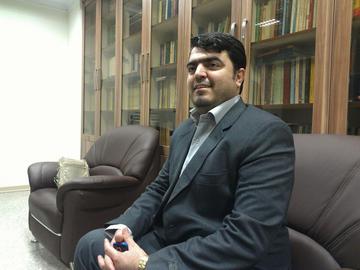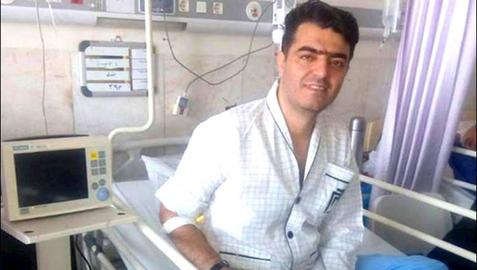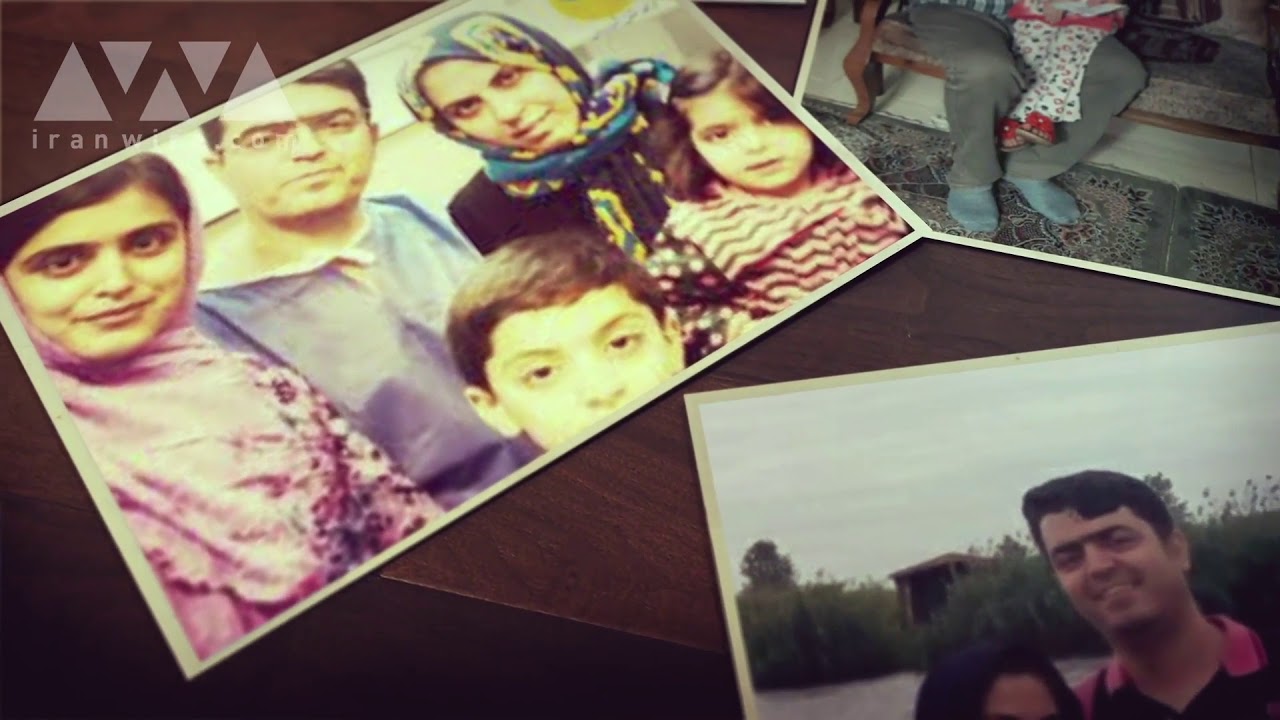Esmail Abdi, the former secretary general of the Iranian Teachers’ Trade Association (ITTA), is one of several teachers held at Evin Prison. Since 2006, he has been a member of the teachers’ union for the city of Eslam Shahr, a district of Tehran. He has a degree in mathematics and has taught students in the most deprived neighborhoods of southern Tehran. He also holds a diploma from the World Chess Federation and has taught chess to high school students.
He was first arrested on March 14, 2007 during a protest rally outside the Ministry of Education, but was released after a day. Six months later, security police again arrested him during a Council to Coordinate Nationwide Teachers’ Unions meeting and, again, he spent a day in detention. He was arrested a third time, on December 31, 2008, at a meeting between a parliamentary faction and representatives of teachers’ unions and, for the third time, he was released after one day.
His fourth arrest was more serious. On May 19, 2010, Intelligence Ministry agents arrested Abdi at his home, presenting a warrant issued by the presiding judge at Branch 1 of Islashahr’s Court. The agents searched his home and confiscated personal items including his laptop, his desktop computer and his diaries.
He was first taken to Evin Prison’s Ward 209 and spent 34 days in solitary confinement and 11 days at the communal ward. He was released on bail but, in 2011, Judge Yahya Pir Abbasi of Branch 26 of Tehran’s Revolutionary Court, who has been accused of extensive human rights violations, gave him a suspended sentence of 10 years in prison on charges of propaganda against the regime and activities against national security, citing articles 500 and 505 of the Islamic Penal Code.
His real crime was supporting the rights and the demands of teachers but his suspended sentence was more about intimidating and threatening teachers’ associations and teachers who had taken civic action than punishing him. His punishment came later, when he disregarded the threat.
On June 23, 2013, authorities confiscated Abdi’s passport as he was crossing the border into Armenia in order to fly from there to Canada to participate in an international gathering of teachers. Four days later, on June 27, Revolutionary Guards’ intelligence agents arrested Abdi for the fifth time. He spent 40 days in solitary confinement and 10 months at Evin Prison wards 7 and 8.
Working Three Jobs
Following his arrest, Abdi's daughter Mobina Abdi wrote a letter to Alireza Khorshidi, the examining magistrate in his case, pleading with him to take a positive view towards her father’s activities to support teachers’ rights and demands [Persian link]. “My father has worked hard for teachers’ rights and still does,” she wrote. “My father woke up at dawn and went to school to teach. He taught two shifts in the morning and in the afternoon and when he returned home he continued his union activities late into the night.
“My father is detained at Evin Prison,” wrote Mobina. “Amir Hossein, Mandana [her siblings] and I miss our father. We feel his absence everywhere in our lives. I want my father. I want my friend, my supporter and my problem solver.”
After he was elected as secretary general of the Iranian Teachers’ Trade Association, he and representatives from 19 local teachers’ associations met with the directors of the Teachers’ Investment Fund and registered the union’s objections to the fund's performance. This fund, with more than 800,000 members who receive annual interest on their investment, is equally financed by its members and the government. In spring 2014, Abdi represented the Iranian Council to Coordinate Nationwide Teachers’ Unions at an international conference organized by the World Federation of Teachers Unions (FISE) in the Turkish capital of Ankara. In the same year, he set up branches of ITTA in several cities.
In 2016, Abdi was elected secretary general for the Iranian Teachers’ Trade Association in general assembly elections.
These activities and others did not escape the attention of authorities hostile to independent unions. On February 2, 2016, Judge Abolghasem Salavati of Branch 15 of Tehran's Revolutionary Court sentenced Esmail Abdi to five years in prison on the charge of “gathering and conspiracy to act against national security” and one year in prison for “propaganda against the regime.” In his verdict, Judge Salavati cited 19 criminal acts Esmail Abdi had allegedly committed, including founding branches of teachers’ union in various cities, participation in two conferences — one on pollution and the other on women’s civil rights — participation in a graveside memorial service for Abolhasan Khan-Ali, a teacher killed in Tehran in 1961 during a protest by teachers that turned violent, meeting with the families of those killed in the aftermath of the disputed 2009 presidential election and his support for labor unions.
Punished for Demanding Constitutional Rights
Abdi is just one of the many teachers who have been imprisoned for their union activities. Both the Iranian Teachers’ Trade Association and the Council to Coordinate Nationwide Teachers’ Union have pointed out in statements that the imprisoned teachers have been found guilty only because they have defended the unquestionable rights of teachers and students, opposed privatization of the educational system, protested against the government’s failure to implement the law for parity in the salaries of government employees, and because they have protested against violations of the “Rights of the People” as defined by the constitution of the Islamic Republic, as outlined below:
- Article 26: “Political parties, societies, political and craft associations, and Islamic or recognized minority religious associations may be freely brought into being, provided that [there is] no violation of the principles of independence, freedom, national unity, Islamic standards, and the foundations of the Islamic Republic. No person may be prevented from joining, or [from being] compelled to join, one of the above.”
- Article 27: “Unarmed assemblies and marches may be freely organized, provided that no violation of the foundations of Islam is involved.”
- Article 30: “The Government is bound to make available, free of charge, educational facilities for all up to the close of the secondary stage, and to expand free facilities for higher education up to the limits of the country's own capacity.”
In April 2016, in protest against his sentence, Esmail Abdi went on a hunger strike. He was joined by Jafar Azimzadeh, the Secretary General of the Free Union of Iranian Workers. “From today,” he wrote in a letter to prison officials, “I go on an open-ended hunger strike to protest against security charges being brought against union activities and gatherings by workers and teachers, against wages and salaries being under the poverty line, against the ban on free celebration of International Workers’ Day and World Teachers’ Day, against the failure of the International Labor Organization to transparently and effectively handle violations of the basic rights of Iranian workers and teachers...”
Abdi’s conditions deteriorated after his hunger strike and he had to be hospitalized. After a widespread campaign by teachers and civil rights activists, he was released on bail on May 14, 2016, pending the verdict of the court of the appeals. On October 7, 2016, Branch 36 of Tehran’s Revolutionary Court of Appeals upheld his six-year prison sentence. On November 9 he was arrested at his home and was taken to Evin Prison’s Ward 8.
On April 30, 2017, Abdi went on another hunger strike in protest against the lack of independence of the judiciary in issuing verdicts against teacher and labor unionists held on charges of endangering national security. He also demanded that the judiciary drop security-related charges against him and that it send his case to ordinary instead of Revolutionary Courts. More than a month after he started his hunger strike, on June 3, 2017, Esmail Abdi was transferred to the hospital after his condition became critical. According to Abdi’s relatives, he had been suffering kidney pain and irregular blood pressure, as well as significant weight loss.
“Abdi’s health condition is not good at all,” his wife Monireh told Radio Farda. “He has been admitted to the emergency ward at Imam Khomeini hospital as of noon last Saturday. He is in a poor physical condition and feeling very weak. They have given him tests, but we want him to be admitted to an ordinary ward in the hospital so he can continue his hunger strike there.”
On January 7, 2018, Abdi was granted a medical leave of absence. After a spirometry and CT scan, a lung specialist determined that he was suffering from low-level asthma due to breathing the closed air of the prison for a long period of time. The doctor also said that if he were to return to prison his ailment would continue to worsen. Nevertheless, his request for an extension on his medical furlough was denied and he was returned to Evin Prison on January 20, 2018, only two weeks after he was admitted to the hospital.
“An International Inspiration”
In spring 2018, Britain’s National Association of Schoolmasters Union of Women Teachers (NASUWT) presented its International Solidarity Award to Esmail Abdi at its Annual Conference in Birmingham. “Esmail Abdi is an inspiration to teachers and trade unionists across the world, through his courage to stand up for trade unions and human rights in the face of oppressive and harsh treatment,” said Chris Keates, secretary general of the union. “Esmail’s courage and determination to continue to fight for quality education in Iran, despite the terrible personal cost he has had to endure, is truly humbling.”
On April 24, 2018, Abdi embarked on another hunger strike in protest against widespread violations of the civil rights of workers and teachers. On April 26, Amnesty International demanded “urgent action” for his immediate and unconditional release. After 23 days, during which he lost 15 kilos, he ended his hunger strike due to his unbearable physical condition.
During this time, various Iranian and foreign organizations demanded his release, including Tehran Unified Bus Company’s Drivers Union, the Institute of International Education in New York, the Iranian Teachers' Association, the Iranian Council to Coordinate Nationwide Teachers’ Unions, the Canadian Teachers' Federation, the Kurdistan Teachers’ Trade Association and numerous labor and civil rights activists.
Living without an Income
Esmail Abdi married Monireh Abdi in 1976. They have three children: Mobina, 19, an accounting student at Karaj Azad University, Amir Hossein, 11, and Mandana, a girl aged four. Monireh Abdi, who is currently studying for a Master’s degree in architecture, talked to IranWire about the financial difficulties the family began to suffer after the government stopped paying her husband’s salary [Persian link]. “I do not have a job and I am currently preparing my dissertation,” she says. “To pay for our living expenses, Esmail worked two shifts before he was imprisoned. He taught from morning to afternoon and again from afternoon into the evening. He worked as a chess teacher and a referee at chess tournaments. Now our expenses are paid by the Teachers’ Trade Association’s assistance fund. Abdi’s salary was stopped four years ago.
“Even four years ago, while doing three jobs, it was difficult to pay for our living costs,” Monireh Abdi says. “In total he made two million tomans [a little over $600 in 2015 exchange rates]. Just imagine how we are paying our expenses now — let alone the fact that, at the time, our third child was a baby and did not have many expenses and our older daughter was not yet a university student.”
She says that the union’s fund helps by paying them between 3 to 3.5 million tomans (between $257 and $300) a month. “They also pay the expenses of Abdi’s lawyer,” she says. “And our family helps us as well. Even so, we have to pay 1.5 million tomans [$129] for the rent. Then there are the heavy expenses of my daughter, who studies at Azad University. My son is a sixth-grader and my youngest daughter is going to pre-school. All of this means expenses.”
“According to Article 134 of the Islamic Penal Code, the sentences against my husband have been consolidated and he has to serve five years,” she says. “He is now at Ward 4 of Evin Prison and has 18 months more to serve. He has served more than four years of his sentence and the judiciary officials could have given him a pardon based on Article 134 of the penal code but they rejected his plea to do so.”
Recently, Esmail Abdi was granted a short leave of absence. He is now back at Evin Prison.
Related Coverage:
Seven Arrests and Eight Years in Prison for Defending Workers’ Rights, July 30, 2019
Workers Beaten and Arrested at May Day Parade, May 1, 2019
Crackdown on Labor Activists on Eve of May Day, April 29, 2019
Labor Activists Face Intense Pressure for Another TV Confession, February 22, 2019
Intelligence Ministry Takes Revenge on Labor Activist, February 4, 2014
Torture of Arrested Labor Activists and Their Families Continues, February 1, 2019
Agents Target Jailed Activist's Family in Brutal Attack, January 23, 2019
Iranian TV Airs Forced Confessions of Labor Activists, January 23, 2019
Labor Protests and Arrests Continue, December 12, 2018
Sugar Refinery Workers Face New Round of Harassment, December 5, 2018
Striking Steel Workers Tell Rouhani: "We Have Had it!", December 3, 2018
Arrest and Torture of Protesting Workers, November 29, 2018
The Plight of Iran’s Unpaid Workers, April 10, 2018
visit the accountability section
In this section of Iran Wire, you can contact the officials and launch your campaign for various problems




























comments